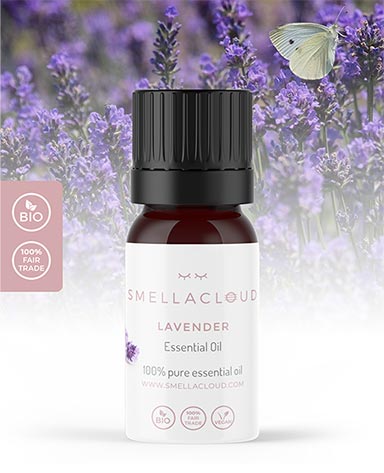
Top 5 Essential Oils for Sleep
If you are someone who struggles to fall asleep or stay asleep, essential oils may help. Aromatherapy can be used to elevate your state of relaxation and aid in a deeper night of sleep
Sleep is connected to our overall health and well being. Not getting enough sleep can weaken the immune system, cause difficulties thinking, and increase weight gain. Research from the National Library of Medicine shows that aromatherapy may be a “safe alternative to pharmaceutical interventions for mild to moderate sleep disturbances.” In this article, let’s explore the best essential oils for sleep and the scientific research that supports it.
5 Sleep-Supporting Essential Oils
It's no secret that we love promoting relaxation to improve our overall wellbeing and the quality of our sleep. We are always searching for the best organic, all-natural essential oils that are eco-friendly and toxic-free. Having a regular nighttime routine is a conscious way to ensure that you sleep better and feel better the next day.
This is why we love essential oils and aromatherapy. Not only are oils affordable and natural, but they are simple and easy-to-use. With so many magnificent benefits - such as stress-relief and better sleep - it’s no wonder essential oils have been used for thousands of years. If you’re looking for an effective and affordable way to get the best night’s sleep, here are our top essential oils to add to your nighttime routine.

Lavender
Lavender essential oil is widely recognized for its sleep supporting
attributes. It is used in aromatherapy to induce relaxation and
stabilize mood.
Using lavender essential oil to improve your sleep hygiene is our
recommendation. The soft floral aroma of lavender creates a soothing
atmosphere in your bedroom to create the perfect conditions to calm
down before going to sleep.
Scent Profile
Soothing floral aroma with a hint of pine
How Lavender Essential Oil Improves Quality of Sleep
In a study exploring lavender's effectiveness on sleep, participants exposed to lavender showed significantly better sleep quality, waking to feel refreshed, and less daytime fatigue. Lavender has also been used as an excellent remedy to treat sleep disorders and insomnia.
Add to cartOrange
Orange essential oil is extracted from the rind of sweet oranges called Citrus sinensis. It’s known to have a soothing effect by activating the limbic system, the part of the brain that controls smell sensations.
Scent Profile
Refreshing and sweet
How Orange Essential Oil Promotes Sleep
Sweet orange essential oil was used in a study on “Inhalation Aromatherapy to Promote Sleep in the Elderly with Dementia.” In the discussion, researchers explained that aromatherapy promoted the secretion of serotonin and endorphins, resulting in activation of the parasympathetic nervous system. Endorphins have sedative effects, while serotonin binds to enzymes during the night to produce melatonin which helps to promote sleep.
Add to cart

Bergamot
Bergamot essential oil is famous for its light citrus scent and floral
notes from the fruit Citrus bergamia. Bergamot oil is known to
elevate mood and alleviate stress - two factors can impact a person’s
quality of sleep.
While other citrus essential oils can be energizing, bergamot
essential oil before sleep can slow the heart rate and lower blood
pressure. Its calming effect can reduce stress and anxiety with its
sedative qualities.
Scent Profile
Pleasant citrus tone with a warm, earthy undertone
How Bergamot Essential Oil Improves Quality of Sleep
Two studies show renewed popularity in Bergamot oil to improve mood and mild symptoms of stress-induced disorders (Halcon, 2002) and support sleep induction (Wiebe, 2000).
Add to cartYlang Ylang
When it comes to sleep, ylang-ylang is thought to help you fall asleep faster while also reducing stress and anxiety. Ylang-ylang has been known to balance the brain and reduce negative feelings, like anger.
Scent Profile
Rich floral flavour with a touch of rose and jasmine
How Ylang Ylang Aids in Sleep
One study found that using ylang-ylang, combined with lavender and bergamot, reduces blood pressure, pulse, stress, anxiety, and cortisol. Another study focused on sleep quality and people who suffer from insomnia. Participants exposed to Ylang ylang essential oil reported having a better quality sleep compared to the control group.
Add to cart

Sandalwood
Sandalwood is commonly used in aromatherapy specifically for its
sleep-supporting qualities and alleviating sleep-deprivation symptoms.
Santonal is an organic compound from sandalwood that’s known to
support the body’s central nervous system, which is connected to the
sleep-wake cycle.
While other citrus essential oils can be energizing, bergamot
essential oil before sleep can slow the heart rate and lower blood
pressure. Its calming effect can reduce stress and anxiety with its
sedative qualities.
Scent Profile
Deep, woody scent with soft floral and balsamic accents
What the research says about Sandalwood
Sandalwood is proven to be effective for aroma therapeutical care by acting as a sedative agent, improving rapid recovery from stress and reducing blood pressure.
Add to cartWhat Are Essential Oils?
Essential oils are concentrated plant extracts that preserve the potent fragrances of leaves, herbs, barks, seeds, and rinds. These highly concentrated oils can be inhaled, ingested, or applied to the skin through a lotion, cream, or oil. Some research shows there may be benefits to essential oils for aromatherapy, if you know how to use them correctly. Always consult with your doctor or a certified aromatherapist to ensure essential oils are right for you.
The aromatic compounds are extracted using a method called cold pressing. Cold-pressed essential oils do not use extreme temperatures that can destroy raw ingredients. Instead, friction is used to retain most of the nutrients and active ingredients to create highly-concentrated, intensely fragrant essentials oils.
How to Use Essential Oils for Sleep?
Essential oils can be used to support sleep in different ways. You may choose any of the essential oils above to improve your sleep hygiene or experiment with other mixed blends like 1001 Night, which contains a unique combination of sandalwood, cedarwood and patchouli for a sweet, woody aroma.
Here’s our recommendation to use essential oils with an aroma diffuser:
- Add a few drops to an aroma diffuser filled with water
- Turn on the diffuser and disperse the fragrance in your room
- Shut down all technology and reduce the lights in your bedroom
- Read a book or meditate to relax your mind and body
- Try de-stress herbal tea for a soothing, non-caffeinated beverage before bed
- Enjoy a full night’s sleep!
How Do Essential Oils Improve Sleep?
Sleep hygiene is important. Maintaining a regular bedroom environment with daily routines to eliminate stress, reduce anxiety, and alleviate overthinking can promote consistent, uninterrupted sleep.
Aromatherapy is the holistic practice of using plant extracts to improve the health of your mind, body, and spirit. Combined with powerful effects of essential oils, certain fragrances can have a calming effect. Since smell is associated with olfactory nerve receptors and memory, when you smell a unique fragrance, it sends calming signals to your brain, helping prepare your body for a more relaxing sleep.
Essential oils were used in ancient medicinal practices for centuries. They are a tried and tested herbal method with the ability to promote sleep. Recent studies have also shown that essential oils can aid people who struggle to fall asleep or stay asleep. The sleep-promoting effects of essential oils can be a powerful alternative to over-the-counter medications.

Sign Up!
Get 10% off! By joining us on cloud nine!
Sign up to receive our Back-in-Stock Alert and be the first to know about discounts, giveaways and new products!

